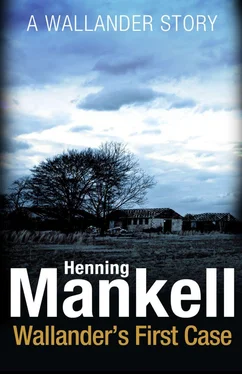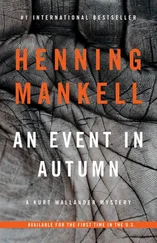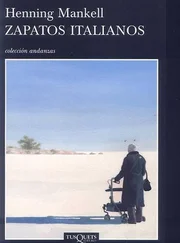Henning Mankell - Wallander's First Case
Здесь есть возможность читать онлайн «Henning Mankell - Wallander's First Case» весь текст электронной книги совершенно бесплатно (целиком полную версию без сокращений). В некоторых случаях можно слушать аудио, скачать через торрент в формате fb2 и присутствует краткое содержание. Год выпуска: 0101, ISBN: 0101, Издательство: Random House, Жанр: Полицейский детектив, на английском языке. Описание произведения, (предисловие) а так же отзывы посетителей доступны на портале библиотеки ЛибКат.
- Название:Wallander's First Case
- Автор:
- Издательство:Random House
- Жанр:
- Год:0101
- ISBN:9781473520721
- Рейтинг книги:4 / 5. Голосов: 1
-
Избранное:Добавить в избранное
- Отзывы:
-
Ваша оценка:
- 80
- 1
- 2
- 3
- 4
- 5
Wallander's First Case: краткое содержание, описание и аннотация
Предлагаем к чтению аннотацию, описание, краткое содержание или предисловие (зависит от того, что написал сам автор книги «Wallander's First Case»). Если вы не нашли необходимую информацию о книге — напишите в комментариях, мы постараемся отыскать её.
Wallander's First Case — читать онлайн бесплатно полную книгу (весь текст) целиком
Ниже представлен текст книги, разбитый по страницам. Система сохранения места последней прочитанной страницы, позволяет с удобством читать онлайн бесплатно книгу «Wallander's First Case», без необходимости каждый раз заново искать на чём Вы остановились. Поставьте закладку, и сможете в любой момент перейти на страницу, на которой закончили чтение.
Интервал:
Закладка:
Henning Mankell
Wallander's First Case
CHAPTER 1
In the beginning, everything was just a fog.
Or perhaps it was like a thick-flowing sea where all was white and silent. The landscape of death. It was also the first thought that came to Kurt Wallander as he slowly began rising back to the surface. That he was already dead. He had reached twenty-one years of age, no more. A young policeman, barely an adult. And then a stranger had rushed up to him with a knife and he had not had time to throw himself out of harm’s way.
Afterwards there was only the white fog. And the silence.
Slowly he awakened, slowly he returned to life. The images that whirled around inside his head were unclear. He tried to catch them in flight, as one catches butterflies. But the impressions slipped away and only with the greatest of effort could he reconstruct what had really happened . . .
Wallander was off duty. It was 3 June 1969, and he had just walked Mona down to one of the Denmark ferries, not one of the new ones, the hydrofoils, but one of the old faithfuls, where you still had time for a square meal during the passage to Copenhagen. She was going to meet up with a friend, they were going maybe to the Tivoli, and, more likely, the clothes shops. Wallander had wanted to come along since he was off work, but she had said no. The trip was just for her and her friend. No men allowed.
Now he watched the boat chug out of the harbour. Mona would be back in the evening and he had promised to be there to greet her. If the weather was still as fine as it was now, they would take a walk. And then return to his apartment in Rosengard.
Wallander noticed he was becoming excited at the very thought. He straightened his trousers and then crossed the street and walked into the station. There he bought a packet of cigarettes, John Silver as always, and lit one before he even left the building.
Wallander had no plans for the day. It was a Tuesday and he was free. He had been putting in a lot of overtime, not least because of the frequent, large-scale Vietnam demonstrations both in Lund and Malmo. In Malmo there had been a clash with the police. Wallander had found the whole situation distasteful. He was not sure what he thought of the protestors’ demands that the United States get out of Vietnam. He had tried to talk to Mona about it the day before but she had not had any opinion other than that ‘the protestors are trouble-makers’. When Wallander, despite everything, insisted on pointing out that it could hardly be right for the world’s greatest military power to bomb a poor agricultural nation in Asia to devastation – or ‘back to the Stone Age’, as he had read that some high-ranking American military official had said – she had struck back and said that she certainly had no intention of marrying a communist.
That had knocked the wind out of his sails. They never continued the discussion. And he was going to marry Mona, he was sure of that. The girl with the light brown hair, the pointy nose and the slender chin. Who perhaps was not the most beautiful girl he had ever met. But who nonetheless was the one he wanted.
They had met the previous year. Before then, Wallander had been involved for more than a year with a girl named Helena who worked in a shipping office in the city. Suddenly one day she had simply told him that it was over, that she had found someone else. Wallander had at first been dumbstruck. Thereafter he had spent a whole weekend crying in his apartment. He had been insane with jealousy and had, after he had managed to stop his tears, gone down to the pub at the Central Station and had much too much to drink. Then he had gone home again and continued to cry. Now if he ever walked past the entrance to the pub he shivered. He was never going to set foot in there again.
Then there had been several heavy months when Wallander entreated Helena to change her mind, to come back. But she had flatly refused and at last became so irritated by his persistence that she threatened to go to the police. Then Wallander had beaten a retreat. And strangely enough, it was as if everything was finally over. Helena could have her new man in peace. That had happened on a Friday.
The same evening he had taken a trip across the sound, and on the way back from Copenhagen he wound up sitting next to a girl who was knitting. Her name was Mona.
Wallander walked through the city lost in thought. Wondered what Mona and her friend were doing right now. Then he thought about what had happened the week before. The demonstrations that had got out of hand. Or had he failed to judge the situation correctly? Wallander had been part of a hastily assembled reinforcement group told to stay in the background until needed. It was only when the chaos broke out that they had been called in. Which in turn only served to make the situation more turbulent.
The only person Wallander had actually tried to discuss politics with was his father. His father was sixty years old and had just decided to move out to Osterlen. He was a volatile person whose moods Wallander found hard to predict. Not least since his father once became so upset he almost disowned his son. This had happened a few years ago when Wallander came home and told his father he was going to be a policeman. His father was sitting in his studio, which always smelled of oil paints and coffee. He had thrown a brush at Wallander and told him to go away and never come back. He had no intention of tolerating a policeman in the family. A violent quarrel had broken out. But Wallander had stood his ground, he was going to join the police, and all the projectile paintbrushes in the world couldn’t change that. Suddenly the quarrelling stopped: his father retreated into acrimonious silence and returned to sit in front of his easel. Then he stubbornly started to outline the shape of a grouse, with the help of a model. He always chose the same motif, a wooded landscape, which he varied sometimes by adding a grouse.
Wallander frowned as he thought of his father. Strictly speaking they had never come to any reconciliation. But now they were on speaking terms again. Wallander had often wondered how his mother, who had died while he was training to be a policeman, could put up with her husband. Wallander’s sister, Kristina, had been smart enough to leave home as soon as she was able and now lived in Stockholm.
The time was ten o’clock. Only a faint breeze fanned Malmo’s streets. Wallander walked into a cafe next to the NK department store. He ordered a cup of coffee and a sandwich, skimmed through the newspapers Arbetet and Sydsvenskan . There were letters to the editor in both newspapers from people who either praised or criticised the actions of the police in connection with the protests. Wallander quickly flipped past them. He didn’t have the energy to read about it. Soon he was hoping not to have to assume any more duties with the riot police. He was going to be a criminal investigator. He had been clear on that from the start and had never made any secret of it. In only a few months he would work in one of the departments that investigated violent incidents and even more serious crimes.
Suddenly someone was standing in front of him. Wallander was holding his coffee cup in his hand. He looked up. It was a girl with long hair, about seventeen. She was very pale and was staring at him with fury. Then she leaned forward so her hair fell over her face and pointed to the back of her neck.
‘Here,’ she said. ‘This is where you hit me.’
Wallander put down his cup. He didn’t understand anything.
She had straightened back up.
‘I don’t think I really understand what you mean,’ Wallander said.
‘You’re a cop, aren’t you?’
‘Yes.’
Читать дальшеИнтервал:
Закладка:
Похожие книги на «Wallander's First Case»
Представляем Вашему вниманию похожие книги на «Wallander's First Case» списком для выбора. Мы отобрали схожую по названию и смыслу литературу в надежде предоставить читателям больше вариантов отыскать новые, интересные, ещё непрочитанные произведения.
Обсуждение, отзывы о книге «Wallander's First Case» и просто собственные мнения читателей. Оставьте ваши комментарии, напишите, что Вы думаете о произведении, его смысле или главных героях. Укажите что конкретно понравилось, а что нет, и почему Вы так считаете.












